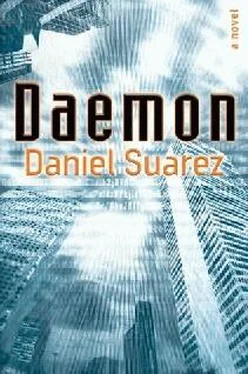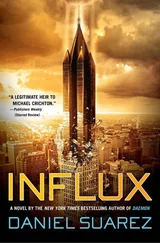Philips: A door.
Ross: Not just any door. A back door.
Philips: It’s a literal door?
Ross: You were expecting a code snippet? Maybe something that accepted anonymous connections at a certain port address or carried out actions on the user’s computer with their rights? But you didn’t find that. You didn’t find it because you shouldn’t have been looking for a back door leading IN. You should have been looking for a back door leading OUT.
Philips: But how would that permit Sobol to control a user’s machine?
Ross: It isn’t their machine he’s trying to control.
Philips: You’re saying he was trying to control the user?
Ross: Why don’t you step through the portal and find out?
Philips: Wait a minute. We still should have found this in the code.
Ross: Why? Were you looking for a graphic of a door that when used as an object in the game environment loads a game map? Do you know how many times that innocuous function call appears in the source code? The code itself is benign—it’s the map it loads that isn’t. Because the map in question is not on the CyberStorm servers, and I’ll bet you didn’t look farther than the IP addresses of the map links.
Philips: [a sigh of disgust] You mean he’s using a redirect.
Ross: It will look local in the map database, but when you try to load it, it redirects to an external IP address—which logs the user off the current game and establishes a new connection on an alien server. In short: this portal leads to a darknet.
Philips: A darknet. An encrypted virtual network.
Ross: Correct. Except that this is a graphical darknet.
Philips: How do you know all this?
Ross: Like I said—step through the portal. However, I will leave you now. Your colleagues are quite skilled and have probably located my zombie in Sweden, maybe even my zombie in Germany—and I really must be going. Please remember that I am innocent, Natalie—if I may call you Natalie. I’d really like to tell you the whole story over dinner sometime.
Philips: I don’t date felons, Jon—especially cross-dressing felons.
Ross: Till we meet again, Doctor…
At that, Ross’s avatar disappeared—as did his magical gate—leaving her in relative darkness. There was just the faint glow emanating from the door.
NSA Tech: He’s off-line, Doctor.
Philips: We’re still recording?
NSA Tech: Affirmative.
On-screen, Philips approached the door and activated it. It creaked open, the noise echoing down the sewer tunnel. Animated cobwebs stretched. A dialog box appeared reading “Loading Map…”
NSA Tech: Connection severed to CyberStorm server. We’re establishing a connection to an IP address assigned to a domain in…South Korea.
Philips: Are the packets really routing there?
NSA Tech: Stand by.
Philips: Get us a fix as soon as possible.
In a few moments the map was loaded. Philips’s character moved out into a medieval hall, with a gallery on either side above and pennants hanging down bearing heraldic symbols. Set into the wall straight ahead was a statue of a man, disquietingly similar to Sobol, in flowing robes, hands outstretched. Virtual water glimmered like a fountain as it rolled down each cheek from his eyes. Mineral stains marked the path. A perpetual fountain of tears.
A black-robed figure stood before the statue like a sentinel blocking her way. Its face was lost in shadow.
NSA Tech: It’s fingering us, Doctor. I didn’t spoof our IP address.
Philips: It’s okay, Chris, I didn’t ask you to.
The hooded figure snapped alert suddenly, then raised a finger and pointed at her.
Guardian: You don’t belong here!
Lightning arced from that finger in her general direction, and the Blue Screen of Death filled their view.
Then everything went black.
NSA Tech: We are down! Down, down, down!
Pete Sebeck stared at a dimple in the concrete of his cell wall. It was the only imperfection in an unrelenting sameness. It was his secret—a place upon which to center his mind as the world turned unseen around him.
It might have been night outside, but it was never dark in here. There was nothing even to mark the passage of time, and if there was, they would erase it. He was watched constantly. A fluorescent fixture buzzed light down on him from overhead. Surveillance cameras in mirrored enclosures on two ceiling corners recorded his every movement. A microphone his every utterance. He was alone, but never alone. As a high-profile prisoner, no expense had been spared to monitor him 24/7—guarding against the possibility that he might harm himself before the government could mete out justice.
As Sebeck lay staring at the wall, his memories were still raw nerves. Each turn of his mind made him wince.
Worth losing everything for. That’s what he used to tell himself about Cheryl Lanthrop. She was beautiful, but there was more to it than that. It was what that reflected about him. That he was worthy of attracting such a successful, confident person. Why did he think she would want him? What part of him nursed such fantasies? That was the sad truth of it. He was ripe for programming. He was ready to suspend disbelief to live that life. He hadn’t wanted to know the truth—not about her and definitely not about himself.
They said Lanthrop was dead now. If she had only confided in him. Perhaps he would have done the right thing. To his shame, he wasn’t certain.
The trial had been a fast-moving media circus. He was shocked at how incriminating the evidence against him was. In hindsight he felt it should have been obvious that he was being set up—Lanthrop urging him to secrecy. And then there were the things he had no knowledge of that crucified him. The files on his computer. Lists and corporate documents, all digitally shredded—but incompletely. A passport under the fictitious name Michael Corvus. The travels of that fictitious name, establishing offshore bank accounts and corporations. The credit card purchases and corporate officerships. The offshore payments and records of phone calls to Pavlos and Singh. The e-mail accounts detailing a convenient, media-friendly conspiracy.
Everyone believed that Sebeck was responsible for the deaths of all those people—and of Aaron Larson. He recalled the several times Larson sought guidance from him. Sebeck had refused the role of mentor. Being a father figure to anyone was the last thing he wanted.
Sebeck could hardly blame the public for hating him. The evidence was wide and deep. The clincher was that Sebeck did, indeed, have an affair with Cheryl Lanthrop. What they did together seemed merely kinky and strange at the time—but when combined with the mountain of evidence against him, it revealed a person quite different from the public face of Detective Sergeant Peter Sebeck, decorated officer and dedicated family man. So different that he had begun to question it himself.
His wife, Laura, surprised him, though. He thought she would be glad to be rid of him.
Strange. After all this time, he couldn’t recall whether she goaded him into marriage or whether he had volunteered as a means of doing the right thing by her. It never even occurred to him at the time that she might not want to marry him. The pregnancy had been something that happened to him—at least in his own mind. Perhaps she had married him because she also thought that was the right thing to do.
After his arrest, when everyone abandoned him, she was there for him. The press pilloried her as a guileless moron, but she knew him. Tears welled in Sebeck’s eyes remembering it. She knew he could not have done these things, even when he doubted it himself. She had kept him sane, or near enough to sane.
Читать дальше












